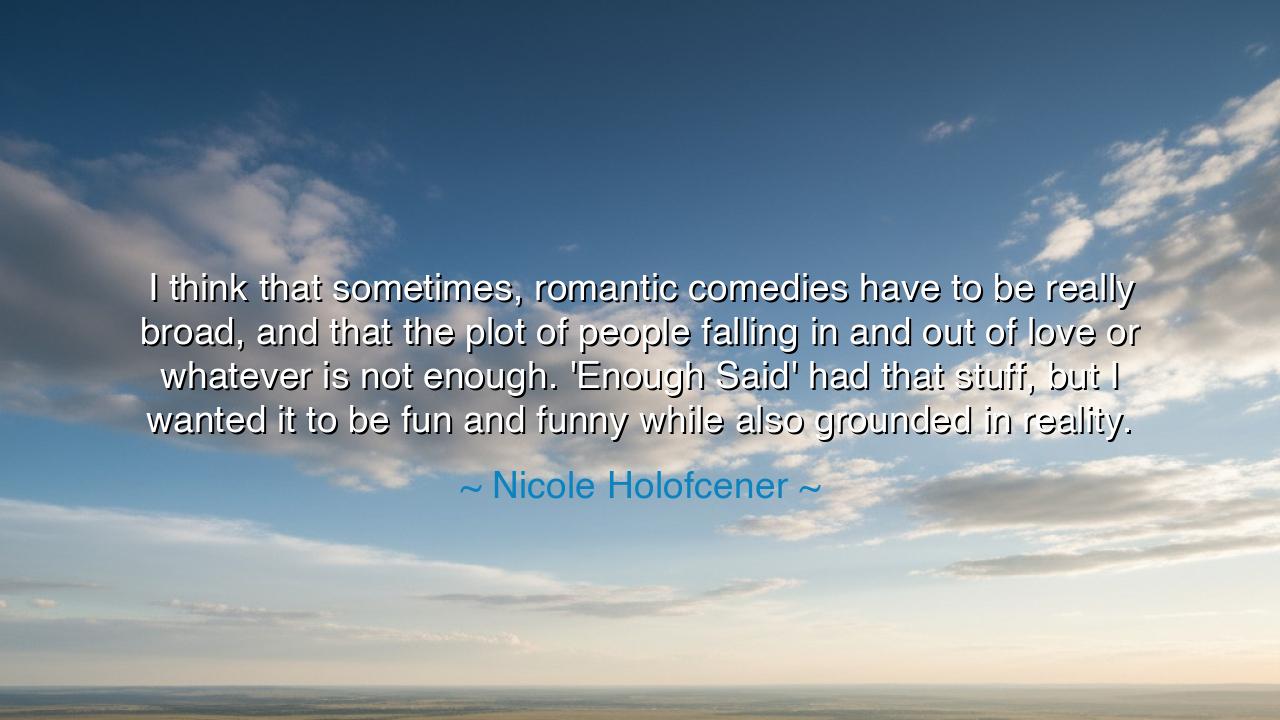
I think that sometimes, romantic comedies have to be really
I think that sometimes, romantic comedies have to be really broad, and that the plot of people falling in and out of love or whatever is not enough. 'Enough Said' had that stuff, but I wanted it to be fun and funny while also grounded in reality.






The words of Nicole Holofcener—“I think that sometimes, romantic comedies have to be really broad, and that the plot of people falling in and out of love or whatever is not enough. Enough Said had that stuff, but I wanted it to be fun and funny while also grounded in reality”—strike at the heart of storytelling itself. For she reminds us that while tales of love are timeless, they cannot survive on sentiment alone. To truly endure, they must be infused with truth, with the texture of real life, with the struggles and imperfections that make human connection not only desirable but believable.
The origin of this wisdom lies in the history of drama and comedy across the ages. The Greeks, who first defined comedy, filled their plays not only with laughter but with reflections of society. Aristophanes did not merely amuse; he critiqued, provoked, revealed. Later, Shakespeare too wove reality into his comedies. Beneath the disguises and laughter, Much Ado About Nothing and As You Like It showed the pain of betrayal, the fear of rejection, the frailty of the human heart. So too does Holofcener’s vision align with this ancient tradition: romantic comedies must not only delight but reveal the truth of what it means to love.
Consider also the story of Jane Austen. Her novels, though often described as romances, endure because they are not simply about falling into love’s embrace. They are about character, society, flaws, and growth. Pride and Prejudice captivates not because Elizabeth and Darcy fall in love, but because they must confront pride, error, and misunderstanding to reach it. Austen’s greatness lay in rooting romance in the soil of reality, showing that love is not a dream detached from the world but a triumph wrestled from human imperfection.
Holofcener, in invoking Enough Said, claims this same heritage. She wanted her film not to float as fantasy but to touch the ground, to reflect the awkwardness, the vulnerability, and the humor of actual life. To her, fun and funny must not come at the expense of authenticity. For love, when stripped of reality, becomes a shallow mask; but when wedded to truth, even the smallest gesture—a smile, an apology, a moment of hesitation—can carry the weight of eternity.
The lesson is clear: art must balance joy with honesty. To entertain is noble, but to do so while revealing truth is greater still. If we seek only the illusion of perfect love, we will be disappointed when life proves otherwise. But if we can laugh at our flaws, find beauty in our awkwardness, and embrace the truth of our shared humanity, then our love stories—whether on the page, the screen, or in life itself—will endure.
Practically, this means we must not demand that love be flawless or cinematic. Rather, we must welcome the grounded reality of relationships: the misunderstandings, the compromises, the imperfections that shape true connection. When we tell our stories—whether as artists, as friends, or as lovers—we must tell them not only with sweetness, but with honesty. In doing so, our joy becomes deeper, our laughter more sincere, and our love more enduring.
Thus, Holofcener’s words are not only about cinema; they are a mirror held to life itself. She teaches us that romance is not enough when it floats above reality—it must be rooted, tested, and human. A story is strongest when it is both delightful and true.
And so, let this truth be handed down: in art and in life, seek not only to be swept away by love, but to ground it in reality. For only then does laughter carry wisdom, and only then does romance rise from fleeting fantasy to sacred truth.






AAdministratorAdministrator
Welcome, honored guests. Please leave a comment, we will respond soon